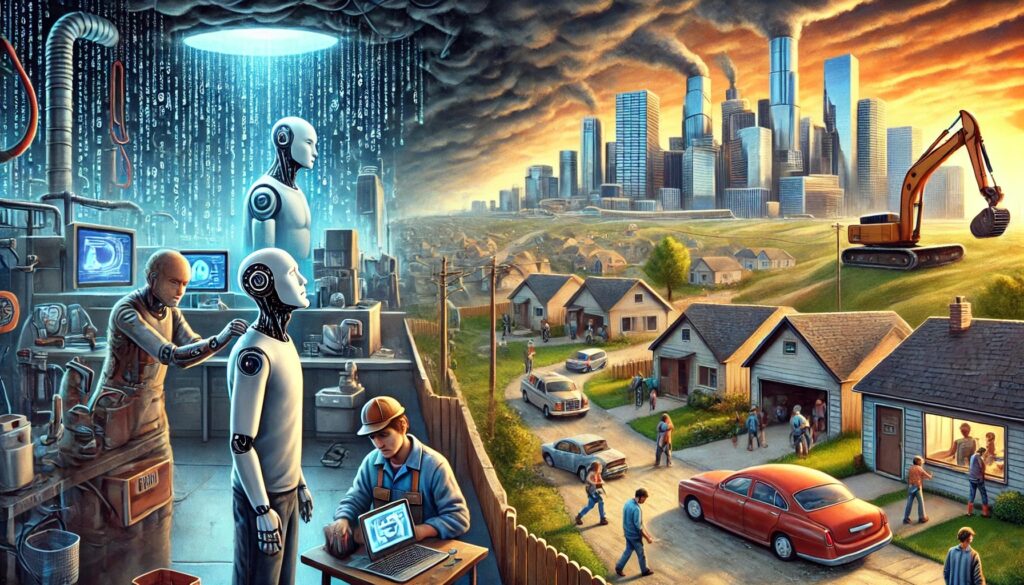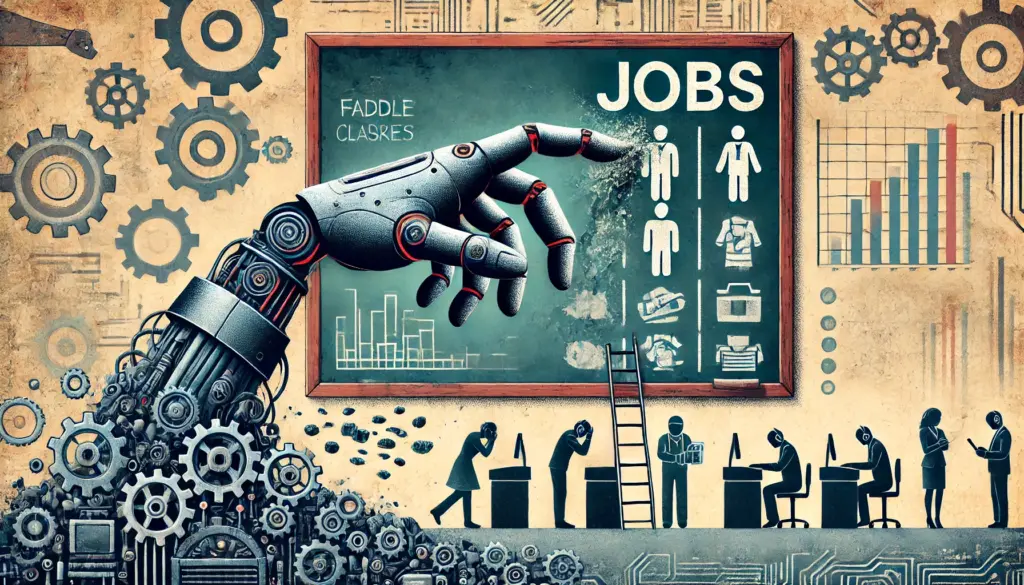
ChatGPT:Will A.I. Kill Meaningless Jobs? And is that so bad?
🎭 The Illusion of Glamour in Silicon Valley
Brad Wang’s early career in Silicon Valley, with its game rooms, nap pods, and hiking trails, seemed luxurious at first. However, this superficial allure masked the underlying hollowness of his work. Wang experienced a series of tech roles that felt pointless, including a 15-month stint at Google on a doomed project and over a year at Facebook on a product deemed unhelpful by its primary customer. His frustration grew as he realized the futility of his efforts, likening it to “baking a pie that’s going right into the trash can.”
📜 A Historical Perspective on Meaningless Work
The sense of pointlessness in the corporate world is not new. Cultural references like the 1990s film “Office Space” and Herman Melville’s 19th-century story “Bartleby, the Scrivener” highlight the long-standing frustrations of workers. These narratives echo the sentiments of many who feel trapped in jobs that, despite decent salaries and benefits, offer no real sense of purpose.
📘 David Graeber’s Concept of Bullshit Jobs
In 2013, radical anthropologist David Graeber introduced the concept of “bullshit jobs,” describing roles that even the workers themselves find pointless. This idea resonated widely, particularly among those feeling the 21st-century frustration of seemingly futile work. Graeber argued that many jobs exist only to maintain the illusion of productivity, rather than providing any real societal value.
🤖 AI’s Potential to Eliminate Meaningless Jobs
As AI technology advances, it brings the potential to automate many of these meaningless roles. A Goldman Sachs estimate suggests that generative AI could eventually displace the equivalent of 300 million full-time jobs globally, particularly in administrative and middle-management roles. This shift raises the question: if AI eliminates jobs that workers find meaningless and degrading, would this be a positive change?
🏢 Flunkies, Goons, and Box Tickers
Graeber categorized meaningless jobs into types like “flunkies,” who make important people appear more significant; “goons,” who exist because competitors have similar roles; and “box tickers,” who perform tasks that produce no real value. AI is already encroaching on these roles, with technologies like IBM’s AI assistants and Gmail’s auto-reply functions reducing the need for human administrative tasks.
📞 AI’s Impact on Telemarketing and Software Engineering
Telemarketing, often considered a “goon” job, is increasingly automated by AI chatbots that handle repetitive tasks without fatigue. Similarly, software engineering can veer into “box ticking” territory, as Brad Wang experienced. These roles, which often involve writing code that never goes live, are also at risk of automation.
📉 Economic and Social Concerns
While eliminating meaningless jobs might seem beneficial, it also poses significant economic and social risks. Many of these roles have provided stable incomes and opportunities for upward mobility. The disappearance of such jobs could further hollow out the middle class, reducing economic mobility and increasing inequality.
🧠 Psychological Impact and New Roles
AI’s ability to automate certain tasks might lead to a species-level identity crisis, prompting workers to ask deeper questions about the purpose of their work. Kevin Kelly, a co-founder of Wired, suggests that workers might cycle through stages of acceptance, ultimately finding new, more meaningful roles. However, this transition is not guaranteed to be smooth or fulfilling.
🔍 The Future of Work in the AI Era
The future of work will likely see a mix of job displacement and creation. Historically, technological advancements have offset job losses with new opportunities, as seen with the rise of the automobile and personal computing industries. However, the meaningfulness of these new roles remains uncertain, and AI’s ability to replace human empathy and connection in jobs like therapy or customer service poses additional challenges.
🌍 Broader Social Implications and Solutions
AI magnifies existing social issues related to labor. Some, like David Graeber and OpenAI’s Sam Altman, advocate for broader solutions such as universal basic income to address these challenges. Meanwhile, movements like Rutger Bregman’s “moral ambition” encourage workers to pursue more socially valuable work.
🚀 Conclusion: A Complex Transition
The transition to an AI-driven workforce is complex and fraught with challenges. While AI might eliminate some meaningless jobs, it also risks creating new roles that are equally unfulfilling. The societal and economic implications of this shift necessitate thoughtful consideration and proactive solutions to ensure that the future of work is both meaningful and equitable.
🎭 The Illusion of Glamour in Silicon Valley
Brad Wang’s early tech career appeared luxurious but revealed a deeper hollowness. Despite game rooms and nap pods, his work on doomed projects at Google and unhelpful products at Facebook left him frustrated, feeling his efforts were futile.
📜 A Historical Perspective on Meaningless Work
Pointless corporate work is a longstanding issue. Cultural works like “Office Space” and “Bartleby, the Scrivener” reflect widespread frustration with jobs that offer no real purpose despite decent pay and benefits.
📘 David Graeber’s Concept of Bullshit Jobs
David Graeber’s 2013 essay introduced “bullshit jobs,” roles seen as pointless by workers. This concept resonated widely, highlighting the illusion of productivity in many modern jobs that lack societal value.
🤖 AI’s Potential to Eliminate Meaningless Jobs
AI could automate many meaningless jobs, potentially displacing 300 million full-time roles globally. This raises questions about whether eliminating degrading jobs would be beneficial, despite the risk of economic and social disruption.
🏢 Flunkies, Goons, and Box Tickers
Graeber’s categories of pointless jobs are vulnerable to AI automation. Roles like administrative assistants and telemarketers are already being replaced by technologies like IBM’s AI assistants and Gmail’s auto-reply functions.
📞 AI’s Impact on Telemarketing and Software Engineering
AI is overtaking telemarketing and some software engineering tasks, handling repetitive work without fatigue. This trend risks further devaluing jobs that already feel meaningless to many workers.
📉 Economic and Social Concerns
Eliminating meaningless jobs threatens economic stability and mobility, particularly for the middle class. These roles have traditionally provided stable incomes and pathways for upward mobility, raising concerns about increasing inequality.
🧠 Psychological Impact and New Roles
AI-driven job displacement could trigger a species-level identity crisis, prompting deeper questions about work’s purpose. While some may find new, more meaningful roles, the transition could be fraught with challenges and uncertainty.
🔍 The Future of Work in the AI Era
Technological advancements historically create new jobs, offsetting losses. However, AI’s impact on job meaningfulness and roles requiring human empathy poses unique challenges, necessitating thoughtful adaptation.
🌍 Broader Social Implications and Solutions
AI amplifies existing labor-related social issues. Solutions like universal basic income and movements encouraging socially valuable work could help address these challenges, ensuring a more equitable future.
🚀 Conclusion: A Complex Transition
AI’s impact on work is complex, potentially eliminating some meaningless jobs while creating new, possibly unfulfilling roles. Addressing the societal and economic implications requires proactive solutions to ensure a meaningful and equitable future for work.
The perception of whether a job is meaningful or not can vary widely among individuals, but there are several common factors and requirements that contribute to this assessment. Here are the key elements:
1. Alignment with Personal Values and Goals
- Personal Values: Jobs that align with an individual’s core values and beliefs tend to be seen as more meaningful. For example, someone who values environmental sustainability might find a job in renewable energy fulfilling.
- Personal Goals: Work that helps individuals achieve their long-term personal and professional goals is often considered meaningful. This could involve career advancement, skill development, or contributing to a larger mission.
2. Impact and Contribution
- Positive Impact: Jobs that make a positive difference in the lives of others or contribute to society in a meaningful way are often seen as fulfilling. This might include roles in healthcare, education, or social services.
- Visible Results: Seeing the tangible results of one’s work can enhance the sense of meaning. For example, a construction worker might find satisfaction in seeing a completed building.
3. Autonomy and Control
- Autonomy: Having the ability to make decisions about one’s work and how it is done can increase job satisfaction and the sense of meaningfulness.
- Control: Jobs that offer a sense of control over outcomes and processes can be more fulfilling. This might involve project management or creative roles where individuals have significant input.
4. Skill Utilization and Growth
- Utilizing Skills: Jobs that make full use of an individual’s skills and abilities can be more meaningful. For instance, a graphic designer using their creativity daily.
- Opportunities for Growth: Roles that offer continuous learning and opportunities for professional development are often deemed meaningful. This can include training programs, mentorship, and challenging projects.
5. Recognition and Appreciation
- Recognition: Feeling recognized and appreciated for one’s contributions can significantly impact the perceived meaningfulness of a job. This could be through formal awards, promotions, or simple acknowledgment from colleagues and supervisors.
- Feedback: Constructive feedback and appreciation from peers and supervisors can reinforce the sense of doing meaningful work.
6. Relationships and Community
- Work Relationships: Positive relationships with colleagues and a supportive work environment can enhance the sense of job meaningfulness. Teamwork and collaboration are key components.
- Community: Feeling part of a community or working towards a common goal can increase the meaningfulness of a job. This is often seen in nonprofit organizations or mission-driven companies.
7. Personal Well-being
- Work-Life Balance: Jobs that allow for a healthy work-life balance are more likely to be seen as meaningful. Overworking can lead to burnout, reducing the perceived value of the job.
- Health and Safety: Ensuring physical and mental well-being at work can contribute to a sense of meaningfulness. Safe and healthy work environments are crucial.
8. Ethical and Moral Satisfaction
- Ethical Standards: Working for organizations that adhere to high ethical standards and corporate social responsibility can make jobs more meaningful. Employees often feel better about their work if they believe it is morally and ethically sound.
- Moral Ambition: Pursuing work that aligns with one’s moral and ethical beliefs, such as fighting injustice or promoting equality, can add significant meaning to a job.
Conclusion
A job’s meaningfulness is subjective and influenced by various factors such as alignment with personal values, impact, autonomy, skill utilization, recognition, relationships, personal well-being, and ethical satisfaction. Jobs that meet these criteria are often perceived as more fulfilling and worthwhile.

